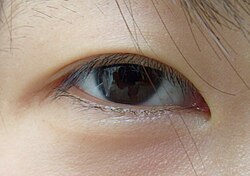Epicanthal folds
| Epicanthic fold | |
|---|---|

A South Korean with the skin fold of the upper eyelid covering the inner angle of the eye.
|
|
| Details | |
| Identifiers | |
| Latin | plica palpebronasalis |
| TA | A15.2.07.028 |
| FMA | 59370 |
|
Anatomical terminology
[]
|
|
Epicanthic fold (/ɛpɪˌkænθɪk ˈfoʊld/),epicanthal fold, epicanthus, and eye fold are names for a skin fold of the upper eyelid, covering the inner corner (medial canthus) of the eye. Other names for this trait include plica palpebronasalis and palpebronasal fold. One of the primary facial features that is often closely associated with the epicanthic fold is elevation of the nasal bridge. All else equal, a lower-rooted nasal bridge is more likely to cause epicanthic folds, and a higher-rooted nasal bridge is less likely to do so. There are various factors that influence whether someone has epicanthic folds, including geographical ancestry, age, and certain medical conditions.
Epicanthic folds appear in East Asians, Southeast Asians, Central Asians and some South Asians, Polynesians, Indigenous Americans, the Khoisan, Malagasy, and occasionally in Europeans (e.g., Scandinavians, Hungarians, Samis, Irish and Poles) and among Nilotes.
...
Wikipedia
